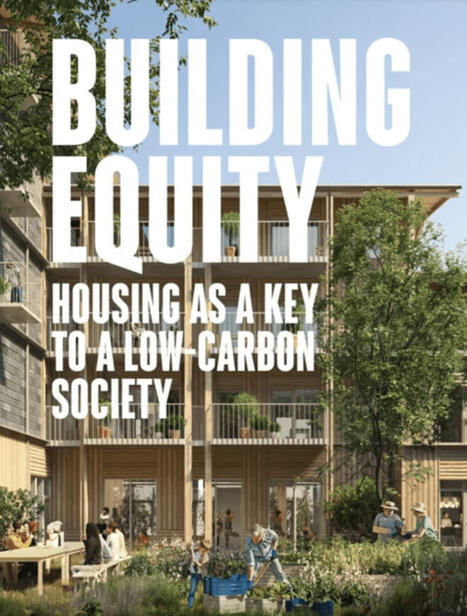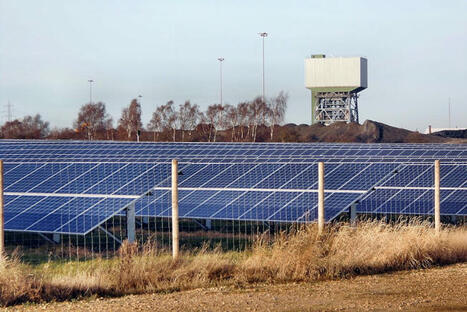 Your new post is loading...

|
Scooped by
Energy Cities
May 26, 3:38 AM
|
In today’s episode of The Jolt, Kira and Sam discuss the issues surrounding building renovation in Central and Eastern Europe, plus there’s some good news from renewable energy production in China

|
Scooped by
Energy Cities
March 21, 5:33 AM
|
The European Union announced itself as a potential early climate champion in 2018 by pledging to reach climate-neutrality by 2050. Yet, rules and regulations are needed to bring emissions down sufficiently to make ‘climate neutrality’ a feasible reality. A lot of work has been done but much is still on the agenda. Politics clashes with policy, continuing to influence what degree of legislative ambition can be pursued.

|
Scooped by
Energy Cities
March 7, 9:40 AM
|
The Bellona Environmental Foundation recently provided its views on the EC’s recently announced energy package. Headquartered in Norway, Bellona has evolved into a recognised technology- and solution-oriented organisation with offices in Oslo, Brussels, Berlin, and Vilnius. The EU’s Affordable Energy Action Plan – watt is it all about? On February 26th, the European Commission…

|
Scooped by
Energy Cities
February 6, 9:39 AM
|
This in-depth report examines how housing can serve as a lever for both environmental and social equity, focusing on the crucial intersection of affordable housing and decarbonization.

|
Scooped by
Energy Cities
January 31, 8:16 AM
|
To truly decarbonise, we must rethink wasteful systems; renewable energy alone won’t replace fossil fuels. Decarbonising our energy supply through renewabl

|
Scooped by
Energy Cities
January 13, 10:59 AM
|
Neutralité carbone et zéro artificialisation nette (ZAN) d’ici 2050, zones à faibles émissions (ZFE), protection des espaces naturels, renaturation des villes et villages, rénovation énergétique, réduction des consommations d’énergie et prévention des risques naturels : officialisé le 27 janvier 2023, le Fonds vert doit permettre aux collectivités territoriales d’atteindre ces différents objectifs dans le cadre de leur transition écologique.

|
Scooped by
Energy Cities
December 16, 2024 10:20 AM
|
For the final Watt Matters of the series on 2030’s energy mix, David, Kira, and Jan discuss the lessons and takeaways from the previous episodes and look forward to what the energy transition holds for 2025 and beyond

|
Scooped by
Energy Cities
November 27, 2024 5:34 AM
|
Stay informed on the global energy transition with FORESIGHT Climate & Energy. Get expert insights and the big picture of decarbonisation in just 15 minutes a day - hands-free and easy to fit into your daily routine.

|
Scooped by
Energy Cities
July 29, 2024 10:06 AM
|
The construction industry is not on track to decarbonise by 2050 and uses more resources than most. In 2020, the UK produced a staggering 59.1 million tonnes of non-hazardous construction and demolition waste. Despite most of this material (92.6%) being recycled, much of it was crushed for use in roads and building foundations.

|
Scooped by
Energy Cities
July 24, 2024 11:32 AM
|
Accelerating the rollout of decarbonised, renewable and affordable heating and cooling means energy sovereignty and a host of co-benefits for EU industry and citizens alike. The new European Commission leadership must act now to position heating and cooling decarbonisation as a key pillar for the 2024-2029 policy cycle, says Delia Villagrasa of the Cool Heating Coalition

|
Scooped by
Energy Cities
April 22, 2024 10:28 AM
|
Low-energy is the future, either through choice or physics. We are running out of time to have a say.

|
Scooped by
Energy Cities
October 6, 2023 8:39 AM
|
Political ideologies across the spectrum base their societal models on extraction, production creating supply, advertising creating demand, consumption and waste. The profits accumulated in these processes go to either investments in society or fill the pockets of those with stakes in the process. The system concentrates wealth, power, control over information which in turn erodes democracy and increase geopolitical instability. It’s a negative reinforcing spiral driving our civilisation towards collapse, taking the majority of species and stable conditions for life on planet earth with us.

|
Scooped by
Energy Cities
September 27, 2023 4:13 AM
|
District heating and cooling networks are being increasingly considered as opportunities to decarbonise space heating and hot water supply in urban areas
|

|
Scooped by
Energy Cities
April 24, 8:29 AM
|
Rolling out strategic net-zero technologies like heat pumps and geothermal energy will help Europe cut its over-reliance on gas imports from overseas, argue Thomas Pellerin-Carlin, a member of the European Parliament, and Mohamed Ridouani, Mayor of Leuven.
The shifting tides of geopolitics have once again exposed Europe’s vulnerability: outsized reliance on imported gas. In 2023, the European Union’s gas import dependency stood at a staggering 90%, leaving households and businesses exposed to price volatility.

|
Scooped by
Energy Cities
March 21, 4:48 AM
|
When we apply this lens to the building stock level, it becomes clear that we need to significantly step [up] our renovation efforts to reduce emissions from the operational phase, so the energy used for heating and cooling. But at the same time, it's also very important, or it's evident, that this alone won't be enough, precisely because construction itself is linked to so many embodied carbon emissions and consumes a vast amount of resources, and that's where the concept of sufficiency comes in.

|
Scooped by
Energy Cities
February 10, 6:10 AM
|
Europe is facing a housing crisis, with the cost of purchasing or renting a home continuing to rise. BLOXHUB’s Ditte Lysgaard Vind joins the Urban Report to discuss how efforts to decarbonise the built environment can align with the goal of affordable housing

|
Scooped by
Energy Cities
January 31, 8:58 AM
|
The Language of Climate Politics: Fossil-fuel propaganda and how to fight it Dr. Genevieve Guenther. Oxford: Oxford University Press, 2024, 280 pages. $29.

|
Scooped by
Energy Cities
January 29, 2:09 AM
|
Heating our homes and cooling our casas is a vital part of everyday life that is often taken for granted. We expect heat and, increasingly, demand cooling.
But the energy needs and carbon footprint of heating and cooling are huge. Both are expected to grow if strong policies are not put in place to help electrify and increase the share of renewable power.

|
Scooped by
Energy Cities
January 13, 10:40 AM
|
The UK’s electricity was the cleanest ever in 2024, new Carbon Brief analysis shows, with carbon dioxide (CO2) emissions per unit falling by more than two-thirds in a decade.

|
Scooped by
Energy Cities
December 16, 2024 9:17 AM
|
The construction of new gas-fired power plants that are supposed to provide backup capacity for the German electricity system amid the transition to renewable power needs to be put on the new government’s agenda for its first 100 days, after the outgoing government of chancellor Olaf Scholz failed to get the related Power Plant Security Act across the line, the Federation of German Energy and Water Industries (BDEW) has said.

|
Scooped by
Energy Cities
September 3, 2024 8:57 AM
|
The Cool Heating Coalition has started to bring the message on a sectoral approach for heating and cooling decarbonisation to the European Commission as it prepares for the 2024-2029 legislative cycle. In July, we sent a letter to President von der Leyen emphasising that decarbonised and renewable heating and cooling must be made a key objective when setting our 2040 climate target, one of the first major decisions that the new Commission will have to take. The political will is growing: 15 Member States asked the same of the Commission earlier this year.

|
Scooped by
Energy Cities
July 25, 2024 8:06 AM
|
The “Seizing the Chance: From Coal Ash to Solar Cash” webinar, organized by TheMayor.EU in partnership with the European Investment Bank (EIB), took place on 4 June. Read the main takeaways.

|
Scooped by
Energy Cities
May 30, 2024 9:36 AM
|
Heating is a complex part of the energy transition but district networks are a potentially powerful way to achieve widespread decarbonisation. Morgan Henley joins the Policy Dispatch to talk about how Central and Eastern Europe is feeling the benefit of its networks.

|
Scooped by
Energy Cities
April 17, 2024 4:33 AM
|
Policymakers across the globe are searching for solutions to reduce the use of fossil fuels and their associated climate impacts. Attention has focused on For policymakers seeking solutions to reduce fossil fuel use and their associated climate impacts, RAP offers a clean heat standard handbook.

|
Scooped by
Energy Cities
September 27, 2023 4:27 AM
|
Germany, France and Italy have pledged to hit net zero emissions around the middle of the century in a bid to stop weather from growing more extreme.
But the EU’s three biggest economies – and polluters – are all struggling to meet their goals.
|
 Your new post is loading...
Your new post is loading...

































